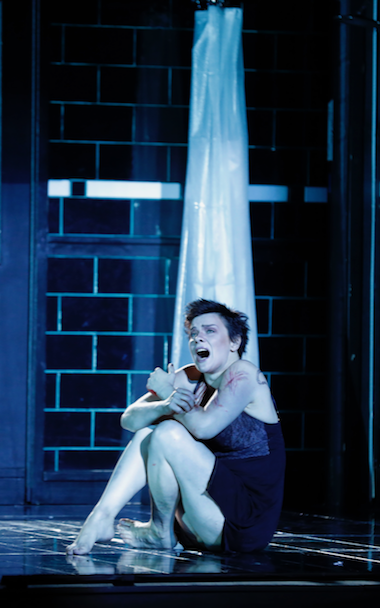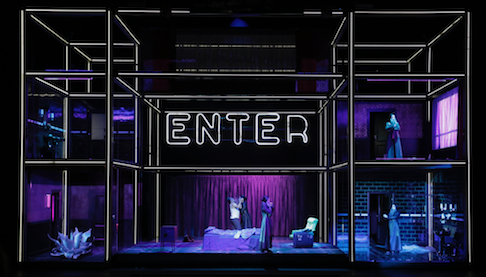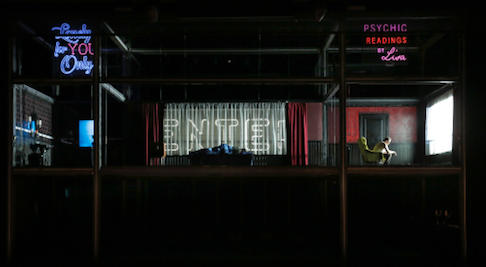
07 Jul 2018
L'Ange de feu (The Fiery Angel)
in Aix
Prokofiev’s Fiery Angel is rarely performed. This new Aix Festival production to be shared with Warsaw’s Teatr Wielki exemplifies why.
English Touring Opera are delighted to announce a season of lyric monodramas to tour nationally from October to December. The season features music for solo singer and piano by Argento, Britten, Tippett and Shostakovich with a bold and inventive approach to making opera during social distancing.
This tenth of ten Live from London concerts was in fact a recorded live performance from California. It was no less enjoyable for that, and it was also uplifting to learn that this wasn’t in fact the ‘last’ LfL event that we will be able to enjoy, courtesy of VOCES8 and their fellow vocal ensembles (more below …).
Ever since Wigmore Hall announced their superb series of autumn concerts, all streamed live and available free of charge, I’d been looking forward to this song recital by Ian Bostridge and Imogen Cooper.
The Sixteen continues its exploration of Henry Purcell’s Welcome Songs for Charles II. As with Robert King’s pioneering Purcell series begun over thirty years ago for Hyperion, Harry Christophers is recording two Welcome Songs per disc.
Although Stile Antico’s programme article for their Live from London recital introduced their selection from the many treasures of the English Renaissance in the context of the theological debates and upheavals of the Tudor and Elizabethan years, their performance was more evocative of private chamber music than of public liturgy.
In February this year, Albanian soprano Ermonela Jaho made a highly lauded debut recital at Wigmore Hall - a concert which both celebrated Opera Rara’s 50th anniversary and honoured the career of the Italian soprano Rosina Storchio (1872-1945), the star of verismo who created the title roles in Leoncavallo’s La bohème and Zazà, Mascagni’s Lodoletta and Puccini’s Madama Butterfly.
Evidently, face masks don’t stifle appreciative “Bravo!”s. And, reducing audience numbers doesn’t lower the volume of such acclamations. For, the audience at Wigmore Hall gave soprano Elizabeth Llewellyn and pianist Simon Lepper a greatly deserved warm reception and hearty response following this lunchtime recital of late-Romantic song.
Collapsology. Or, perhaps we should use the French word ‘Collapsologie’ because this is a transdisciplinary idea pretty much advocated by a series of French theorists - and apparently, mostly French theorists. It in essence focuses on the imminent collapse of modern society and all its layers - a series of escalating crises on a global scale: environmental, economic, geopolitical, governmental; the list is extensive.
For this week’s Live from London vocal recital we moved from the home of VOCES8, St Anne and St Agnes in the City of London, to Kings Place, where The Sixteen - who have been associate artists at the venue for some time - presented a programme of music and words bound together by the theme of ‘reflection’.
'Such is your divine Disposation that both you excellently understand, and royally entertaine the Exercise of Musicke.’
Amongst an avalanche of new Mahler recordings appearing at the moment (Das Lied von der Erde seems to be the most favoured, with three) this 1991 Mahler Second from the 2nd Kassel MahlerFest is one of the more interesting releases.
‘And there was war in heaven: Michael and his angels fought against the dragon; and the dragon fought and his angels, And prevailed not; neither was their place found any more in heaven … that old serpent … Satan, which deceiveth the whole world: he was cast out into the earth, and his angels were cast out with him.’
If there is one myth, it seems believed by some people today, that probably needs shattering it is that post-war recordings or performances of Wagner operas were always of exceptional quality. This 1949 Hamburg Tristan und Isolde is one of those recordings - though quite who is to blame for its many problems takes quite some unearthing.
There was never any doubt that the fifth of the twelve Met Stars Live in Concert broadcasts was going to be a palpably intense and vivid event, as well as a musically stunning and theatrically enervating experience.
‘Love’ was the theme for this Live from London performance by Apollo5. Given the complexity and diversity of that human emotion, and Apollo5’s reputation for versatility and diverse repertoire, ranging from Renaissance choral music to jazz, from contemporary classical works to popular song, it was no surprise that their programme spanned 500 years and several musical styles.
The Academy of St Martin in the Fields have titled their autumn series of eight concerts - which are taking place at 5pm and 7.30pm on two Saturdays each month at their home venue in Trafalgar Square, and being filmed for streaming the following Thursday - ‘re:connect’.
The London Symphony Orchestra opened their Autumn 2020 season with a homage to Oliver Knussen, who died at the age of 66 in July 2018. The programme traced a national musical lineage through the twentieth century, from Britten to Knussen, on to Mark-Anthony Turnage, and entwining the LSO and Rattle too.
With the Live from London digital vocal festival entering the second half of the series, the festival’s host, VOCES8, returned to their home at St Annes and St Agnes in the City of London to present a sequence of ‘Choral Dances’ - vocal music inspired by dance, embracing diverse genres from the Renaissance madrigal to swing jazz.
Just a few unison string wriggles from the opening of Mozart’s overture to Le nozze di Figaro are enough to make any opera-lover perch on the edge of their seat, in excited anticipation of the drama in music to come, so there could be no other curtain-raiser for this Gala Concert at the Royal Opera House, the latest instalment from ‘their House’ to ‘our houses’.
"Before the ending of the day, creator of all things, we pray that, with your accustomed mercy, you may watch over us."

Prokofiev’s Fiery Angel is rarely performed. This new Aix Festival production to be shared with Warsaw’s Teatr Wielki exemplifies why.
Its primary role, the possessed Renata, is punishing nearly beyond comprehension and its relentless, lurid narrative is difficult to follow, and in fact the vulgarity of its music can be off-putting.
The Fiery Angel is the third of Prokofiev’s seven operas (The Gambler and Love for Three Oranges are the first two), and the last opera he wrote before his return to Russia in 1936. Though begun in 1919 when the composer was 28 years old, and completed only in 1927 it was not premiered until 1955 in Paris and then in Vienna.
There is no doubt that The Fiery Angel is Prokofiev’s most intense dramatic music. It tells the ugly story of a young girl possessed by an angel, though perhaps a devil. She wishes to make physical love with her possessor. Two or so hours and several mis-adventures later she is exorcized (unsuccessfully) in a convent together with other nuns. It is a medieval tale of expressed sexual desire told from an early twentieth century symbolist perspective.
 At the beginning there was the hotel room.
At the beginning there was the hotel room.
The possessed Renata and her would be redeemer, the knight Ruprecht seek and do find the angel of fire incarnate with the help of sorcerers. Finally Renata gives herself sexually to Ruprecht in place of the angel. A short philosophical discussion ensues between Mephistopheles and Dr. Faustus. And, voilà, Renata is condemned to be burned at the stake.
Mariusz Trelinski, artistic director of Teatr Wielki, staged the opera updating the action to what seemed to be rural eastern European surroundings in the communist 1960’s. Ruprecht seemed to be some sort of traveling salesman (if there were such then and there) who happened onto a seedy small town hotel. One recalled the Arthur Miller play Death of a Salesman.
Strangely, though we are in France and there are scenes specifically in medieval Cologne there were English language neon signs placed high in a multi-storied grid that was the stage face. The Cologne scenes were then staged on platforms in its upper reaches, effectively and unfortunately disembowelling Renata and Ruprecht’s voices from the dissonant maelstrom emanating from the pit way below.
Japanese conductor Kazushi Ono urged ever greater volume and bombast from the stalwart Orchestra de Paris, complementing the crassness of the staging. One of the many remarkable moments was in fact the long awaited sexual consummation of Renata and Ruprecht, the couple humping on an upper level, the orchestra turging away way down below while a miniature Ruprecht double attempted to jump rope on the stage floor.
 Renata (on left), Ruprecht (on right)
Renata (on left), Ruprecht (on right)
The role of Renata was sung by Aušrinė Stundytė, the Lithuanian soprano who incarnated the brilliant Lady Macbeth of Mtsensk in Lyon. Mme. Stundytė brought similar intensity to the obsessed Renata, but fell victim, understandably, to the obtuse staging demands as well as to the stamina needed to complete the role. She was essentially voiceless for the concluding exorcism.
The American baritone Scott Hendricks was the Ruprecht. This esteemed artist seemed a fish out of water, his fine, Italianate lyric voice not finding an edge or the volume needed to embody this complex, possessed-by-love knight who first attempts to rape Renata, and then in this production is raped by Renata. As well, and more importantly, Mr. Hendricks was placed in the upper reaches of the grid for his big scenes, depriving us of a direct presence, and an immediacy of voice.
Faring better were tenor Andrei Popov as Mephistopheles and bass Krzysztof Baczyk as Faust who both essentially tore up the stage in their stage level scene in the hotel bar. Both artists succeeded in projecting words and sentences that directly tied us to content, however oblique, an attribute sorely lacking in the balance of Mr. Triliński’s production.
Michael Milenski
Cast and production information:
Renata: Aušrinė Stundytė; Ruprecht: Scott Hendricks; La Voyante / La Mère supérieure: Agnieszka Rehlis; Méphistophélès / Agrippa von Nettesheim: Andreï Popov; Faust / L’Inquisiteur: Krzysztof Bączyk; Jakob Glock / Un médecin: Pavlo Tolstoy; Matthieu Wissmann / L'Aubergiste / Un serviteur: Łukasz Goliński; La Patronne de l’auberge: Bernadetta Grabias; Première religieuse: Bożena Bujnicka; Seconde religieuse: Maria Stasiak. Orchestre de Paris, Chorus of the Opera of Warsaw. Conductor: Kazushi Ono; Mise en scène: Mariusz Treliński; Scenery: Boris Kudlička; Costumes: Kaspar Glarner; Lighting: Felice Ross; Vidéo: Bartek Macias; Chorégraphe: Tomasz Wygoda. Grand Théâtre de Provence, Aix-en-Provence, July 5, 2018.